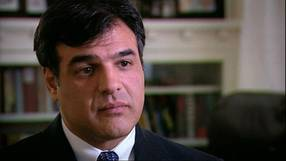Whistleblower Spotlight -- CIA Whistleblower John Kiriakou

Photo Credit: BBC
By the C|C Whistleblower Lawyer Team
This week’s “Whistleblower Spotlight” features John Kiriakou, the former CIA officer sent to jail in 2013 for disclosing details to the press about the agency’s post-9/11 torture tactics. On Tuesday, after serving almost two years of a two-and-a-half year sentence, the government released him to serve the remainder of his sentence under house arrest. Clearly relishing his long-awaited return to his wife and children, Kiriakou channeled Martin Luther King, Jr. in a tweet heard round the Twitter-sphere: “Free at last. Free at last. Thank God Almighty. I’m free at last.”
Kiriakou joined the CIA in 1990 and ultimately rose to the position of Chief of Counterterrorist Operations in Pakistan. In that role he oversaw raids that led to the capture of numerous Al Qaeda members, including the terror group’s logistics specialist Abu Zubaydah. He also became privy to some of the “enhanced interrogation” techniques such as waterboarding the Bush administration had approved in the wake of 9/11. Kiriakou resigned from the agency in 2004 for work in the private sector. In his 2010 book, The Reluctant Spy: My Secret Life In the CIA’s War on Terror, Kiriakou writes how he declined CIA training in these tactics because of what one mentor warned him was the “dangerous moral and legal line” that might be crossed.
It was not until 2007 when Kiriakou first went public with his misgivings about the CIA program. During an interview with ABC reporter, Brian Ross, Kiriakou stated “waterboarding probably is something that we shouldn’t be in the business of doing . . . because we are Americans and we are better than that.” More notably, he pointed to the White House as the source of the authorization to use waterboarding-type techniques. Apparently, he was the first US official to identify waterboarding as official government policy and to acknowledge its use on Al Qaeda prisoners.
Within 24 hours of the interview, the government began its crusade against Kiriakou, ultimately charging him in 2012 with disclosing classified information in violation of the Espionage Act. He agreed to plead guilty to the lesser charge of violating the Intelligence Identities Protection Act for revealing to a journalist the name of a former undercover CIA officer alleged to have taken part in waterboarding. According to Kiriakou, he was simply trying to help the writer find a potential source and had no intention or expectation the name would ever become public. And it never did (at least not until long after Kiriakou was charged).
Many have questioned Kiriakou’s conviction, and the irony of his being the only individual sent to prison on the government torture issue when he was the whistleblower speaking out against it. Perhaps this was put best by retired CIA officer Bruce Riedel, who in 2009 turned down the chance to run the spy agency, and who was Kiriakou’s boss in the 1990s. Shortly after Kiriakou’s conviction, Riedel told the New York Times “‘the irony of this whole thing is, very simply, that [Kiriakou’s] going to be the only CIA officer to go to jail over torture,’ even though he publicly denounced torture. ‘It’s deeply ironic under the Democratic president who ended torture.'”
As for Kiriakou, he has no regrets. “I’m proud of my career,” he told the Washington Post on the eve of his prison send-off. “I wear my conviction as a badge of honor.” With two years of prison now behind him, he has not backed down in his view he did the right thing. In an interview he gave earlier this week with Democracy Now, he stated loud and clear, that despite everything he has had to endure, he would do it all again:
As crazy as it sounds . . . I would do it all over again. What has happened since that 2007 ABC News interview is that torture has been banned in the United States. It is no longer a part of US government policy. And I’m proud to have played a role in that. If that cost me 23 months of my life, well, you know what? It was worth it.
And his advice to future whistleblowers facing the same kind of struggle and risks on whether to say something if you see something that rubs against your moral compass: “Do not remain silent.”
Tagged in: Whistleblower Spotlight and Interviews,